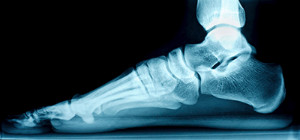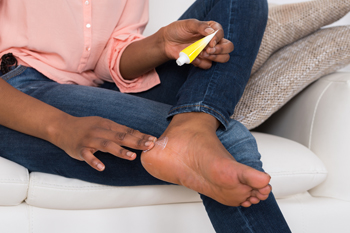(517) 487-5171
Fax (517) 908-0172
August 2020
The Consequences of Flat Feet
 Flat feet refers to the absence of an arch in the middle of the sole of the foot. While some people are born with and continue to have flat feet for their entire lives, others acquire flat feet over time. As you age, your arches can slowly collapse and cause your feet to become flat. This can result in an uneven distribution of your body weight across the surface of your feet when you walk, which might then lead to pain in your feet, calves, knees, hips, and back. If your flat feet are causing you pain or discomfort, then treatment may be necessary. Common treatments for this condition include wearing orthotic devices or specialized footwear and doing foot stretches to strengthen the arch. If you are experiencing pain from flat feet, it is recommended that you seek the care of a podiatrist.
Flat feet refers to the absence of an arch in the middle of the sole of the foot. While some people are born with and continue to have flat feet for their entire lives, others acquire flat feet over time. As you age, your arches can slowly collapse and cause your feet to become flat. This can result in an uneven distribution of your body weight across the surface of your feet when you walk, which might then lead to pain in your feet, calves, knees, hips, and back. If your flat feet are causing you pain or discomfort, then treatment may be necessary. Common treatments for this condition include wearing orthotic devices or specialized footwear and doing foot stretches to strengthen the arch. If you are experiencing pain from flat feet, it is recommended that you seek the care of a podiatrist.
Flatfoot is a condition many people suffer from. If you have flat feet, contact Dr. Gary Cesar from Michigan Foot and Ankle Center. Our doctor will treat your foot and ankle needs.
What Are Flat Feet?
Flatfoot is a condition in which the arch of the foot is depressed and the sole of the foot is almost completely in contact with the ground. About 20-30% of the population generally has flat feet because their arches never formed during growth.
Conditions & Problems:
Having flat feet makes it difficult to run or walk because of the stress placed on the ankles.
Alignment – The general alignment of your legs can be disrupted, because the ankles move inward which can cause major discomfort.
Knees – If you have complications with your knees, flat feet can be a contributor to arthritis in that area.
Symptoms
- Pain around the heel or arch area
- Trouble standing on the tip toe
- Swelling around the inside of the ankle
- Flat look to one or both feet
- Having your shoes feel uneven when worn
Treatment
If you are experiencing pain and stress on the foot you may weaken the posterior tibial tendon, which runs around the inside of the ankle.
If you have any questions please feel free to contact our offices located in Lansing and Mt. Pleasant, MI . We offer the newest diagnostic and treatment technologies for all your foot and ankle needs.
Do I Have Plantar Warts?
 Pain felt on the soles of the feet can be indicative of a condition known as plantar warts. The appearance of plantar warts can be compared to thickened, callused skin, however they often have tiny black dots in their center. Because they’re normally found on the soles of the feet, plantar warts can run the risk of being pushed inward as one walks. Some have described feeling as if a pebble is stuck in their shoe when the plantar warts are pushed inward. For a proper diagnosis and advised treatment plan for plantar warts, please seek the care of a podiatrist.
Pain felt on the soles of the feet can be indicative of a condition known as plantar warts. The appearance of plantar warts can be compared to thickened, callused skin, however they often have tiny black dots in their center. Because they’re normally found on the soles of the feet, plantar warts can run the risk of being pushed inward as one walks. Some have described feeling as if a pebble is stuck in their shoe when the plantar warts are pushed inward. For a proper diagnosis and advised treatment plan for plantar warts, please seek the care of a podiatrist.
Plantar warts can be very uncomfortable. If you need your feet checked, contact Dr. Gary Cesar from Michigan Foot and Ankle Center. Our doctor will assist you with all of your foot and ankle needs.
About Plantar Warts
Plantar warts are the result of HPV, or human papillomavirus, getting into open wounds on the feet. They are mostly found on the heels or balls of the feet.
While plantar warts are generally harmless, those experiencing excessive pain or those suffering from diabetes or a compromised immune system require immediate medical care. Plantar warts are easily diagnosed, usually through scraping off a bit of rough skin or by getting a biopsy.
Symptoms
- Lesions on the bottom of your feet, usually rough and grainy
- Hard or thick callused spots
- Wart seeds, which are small clotted blood vessels that look like little black spots
- Pain, discomfort, or tenderness of your feet when walking or standing
Treatment
- Freezing
- Electric tool removal
- Laser Treatment
- Topical Creams (prescription only)
- Over-the-counter medications
To help prevent developing plantar warts, avoid walking barefoot over abrasive surfaces that can cause cuts or wounds for HPV to get into. Avoiding direct contact with other warts, as well as not picking or rubbing existing warts, can help prevent the further spread of plantar warts. However, if you think you have developed plantar warts, speak to your podiatrist. He or she can diagnose the warts on your feet and recommend the appropriate treatment options.
If you have any questions please feel free to contact our offices located in Lansing and Mt. Pleasant, MI . We offer the newest diagnostic and treatment technologies for all your foot and ankle needs.
What Causes Cracked Heels?
 Cracked heels involves the splitting and cracking of skin, also known as fissures, around the border of the heel. These cracked heels primarily occur when the skin becomes dried out, causing it to lose its strength and elasticity. This causes the skin to crack under pressure which can be very painful. Some factors that can lead to cracked heels include walking barefoot, wearing flip flops, standing for long hours on hard floors, dehydration, a decreased blood supply to the leg, and diabetes. If you are suffering from cracked heels, it is important to consult with a podiatrist for treatment. Treatment options may include a heel balm, a pumice stone, wearing close toed shoes, staying hydrated, and using a topical antiseptic in sever cases when there is bleeding.
Cracked heels involves the splitting and cracking of skin, also known as fissures, around the border of the heel. These cracked heels primarily occur when the skin becomes dried out, causing it to lose its strength and elasticity. This causes the skin to crack under pressure which can be very painful. Some factors that can lead to cracked heels include walking barefoot, wearing flip flops, standing for long hours on hard floors, dehydration, a decreased blood supply to the leg, and diabetes. If you are suffering from cracked heels, it is important to consult with a podiatrist for treatment. Treatment options may include a heel balm, a pumice stone, wearing close toed shoes, staying hydrated, and using a topical antiseptic in sever cases when there is bleeding.
If the skin on your feet starts to crack, you may want to see a podiatrist to find treatment. If you have any concerns, contact Dr. Gary Cesar from Michigan Foot and Ankle Center. Our doctor can provide the care you need to keep you pain-free and on your feet.
Cracked Heels
It is important to moisturize your cracked heels in order to prevent pain, bleeding, and infection. The reason cracked heels form is because the skin on the foot is too dry to support the immense pressure placed on them. When the foot expands, the dry skin on the foot begins to split.
Ways to Help Heal Them
- Invest in a good foot cream
- Try Using Petroleum Jelly
- Ease up on Soaps
- Drink Plenty of Water
Ways to Prevent Cracked Heels
- Moisturize After Showering
- Skip a Shower
- Keep Shower Water Lukewarm
- Don’t Scrub Your Feet
If you are unsure how to proceed in treating cracked heels, seek guidance from a podiatrist. Your doctor will help you with any questions or information you may need.
If you have any questions, please feel free to contact our offices located in Lansing and Mt. Pleasant, MI . We offer the newest diagnostic and treatment technologies for all your foot care needs.
Arthritis Can Cause Pain in the Feet and Ankles
Why Does My Ankle Hurt?
 Ankle pain can have a variety of causes. One of the most common causes of ankle pain is injury from physical activity. Sprains and fractures can occur while exercising, playing a sport, or even walking if the ankle is rolled, turned or twisted awkwardly. Another common cause of ankle pain is osteoarthritis. Osteoarthritis is the type of arthritis usually associated with aging and wears away the cartilage on the ends of your bones and leads to joint damage and pain. Wearing shoes with inadequate support or a poor fit, standing or walking for prolonged periods of time, exercising excessively, or being overweight can result in ankle pain as well. If you are experiencing persistent ankle pain, it is recommended that you consult with a podiatrist.
Ankle pain can have a variety of causes. One of the most common causes of ankle pain is injury from physical activity. Sprains and fractures can occur while exercising, playing a sport, or even walking if the ankle is rolled, turned or twisted awkwardly. Another common cause of ankle pain is osteoarthritis. Osteoarthritis is the type of arthritis usually associated with aging and wears away the cartilage on the ends of your bones and leads to joint damage and pain. Wearing shoes with inadequate support or a poor fit, standing or walking for prolonged periods of time, exercising excessively, or being overweight can result in ankle pain as well. If you are experiencing persistent ankle pain, it is recommended that you consult with a podiatrist.
Ankle pain can have many different causes and the pain may potentially be serious. If you have ankle pain, consult with Dr. Gary Cesar from Michigan Foot and Ankle Center. Our doctor will assess your condition and provide you with quality foot and ankle treatment.
Ankle pain is any condition that causes pain in the ankle. Due to the fact that the ankle consists of tendons, muscles, bones, and ligaments, ankle pain can come from a number of different conditions.
Causes
The most common causes of ankle pain include:
- Types of arthritis (rheumatoid, osteoarthritis, and gout)
- Ankle sprains
- Broken ankles
- Achilles tendinitis
- Achilles tendon rupture
- Stress fractures
- Tarsal tunnel syndrome
- Plantar fasciitis
Symptoms
Symptoms of ankle injury vary based upon the condition. Pain may include general pain and discomfort, swelling, aching, redness, bruising, burning or stabbing sensations, and/or loss of sensation.
Diagnosis
Due to the wide variety of potential causes of ankle pain, podiatrists will utilize a number of different methods to properly diagnose ankle pain. This can include asking for personal and family medical histories and of any recent injuries. Further diagnosis may include sensation tests, a physical examination, and potentially x-rays or other imaging tests.
Treatment
Just as the range of causes varies widely, so do treatments. Some more common treatments are rest, ice packs, keeping pressure off the foot, orthotics and braces, medication for inflammation and pain, and surgery.
If you have any questions, please feel free to contact our offices located in Lansing and Mt. Pleasant, MI . We offer the newest diagnostic and treatment technologies for all your foot care needs.
Plantar Fasciitis: A Common Injury in Runners
 Plantar fasciitis refers to a painful inflammation of the plantar fascia, a tissue that runs along the bottom of the foot, connecting the heel bone to the ball of the foot. The most common cause of this condition is overuse, making it a frequent injury among runners and other athletes. Certain people may be predisposed to plantar fasciitis, including people with flat feet, tight calves or tight Achilles tendons, and those who wear low-quality running shoes. Resting, stretching, doing strength exercises, and wearing the appropriate footwear can help alleviate symptoms. However, it is strongly recommended that you visit a podiatrist if you are prone to this injury. A podiatrist can determine the cause of your recurrent plantar fasciitis, provide you with treatment options, and help you find appropriate running shoes or prescribe orthotics.
Plantar fasciitis refers to a painful inflammation of the plantar fascia, a tissue that runs along the bottom of the foot, connecting the heel bone to the ball of the foot. The most common cause of this condition is overuse, making it a frequent injury among runners and other athletes. Certain people may be predisposed to plantar fasciitis, including people with flat feet, tight calves or tight Achilles tendons, and those who wear low-quality running shoes. Resting, stretching, doing strength exercises, and wearing the appropriate footwear can help alleviate symptoms. However, it is strongly recommended that you visit a podiatrist if you are prone to this injury. A podiatrist can determine the cause of your recurrent plantar fasciitis, provide you with treatment options, and help you find appropriate running shoes or prescribe orthotics.
Plantar fasciitis is a common foot condition that is often caused by a strain injury. If you are experiencing heel pain or symptoms of plantar fasciitis, contact Dr. Gary Cesar from Michigan Foot and Ankle Center. Our doctor can provide the care you need to keep you pain-free and on your feet.
What Is Plantar Fasciitis?
Plantar fasciitis is one of the most common causes of heel pain. The plantar fascia is a ligament that connects your heel to the front of your foot. When this ligament becomes inflamed, plantar fasciitis is the result. If you have plantar fasciitis you will have a stabbing pain that usually occurs with your first steps in the morning. As the day progresses and you walk around more, this pain will start to disappear, but it will return after long periods of standing or sitting.
What Causes Plantar Fasciitis?
- Excessive running
- Having high arches in your feet
- Other foot issues such as flat feet
- Pregnancy (due to the sudden weight gain)
- Being on your feet very often
There are some risk factors that may make you more likely to develop plantar fasciitis compared to others. The condition most commonly affects adults between the ages of 40 and 60. It also tends to affect people who are obese because the extra pounds result in extra stress being placed on the plantar fascia.
Prevention
- Take good care of your feet – Wear shoes that have good arch support and heel cushioning.
- Maintain a healthy weight
- If you are a runner, alternate running with other sports that won’t cause heel pain
There are a variety of treatment options available for plantar fasciitis along with the pain that accompanies it. Additionally, physical therapy is a very important component in the treatment process. It is important that you meet with your podiatrist to determine which treatment option is best for you.
If you have any questions, please feel free to contact our offices located in Lansing and Mt. Pleasant, MI . We offer the newest diagnostic and treatment technologies for all your foot care needs.







